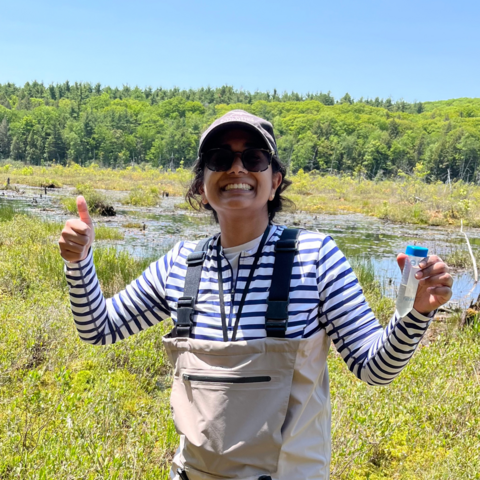Science that matters: Doctoral student seeks to update monitoring protocols of harmful algal blooms in drinking water sources
By Alyana Versolatto
Graduate Recruitment Officer
Have you ever noticed green scum on the surface of a lake? Cyanobacteria are a type of algae that can cause harmful blooms. A large bloom of cyanobacteria looks like a lake that has been painted green. As climate change intensifies land disturbances, there is a rise in runoff and waste in our freshwater systems, and cyanobacteria can bloom using these waste materials as nutrients. Blooms decrease water quality and cyanobacteria can potentially produce harmful toxins that impact the nervous systems and livers of humans and wildlife.
Harshina Brijlall, a PhD in Biology student, is working to identify potential algal toxin-producing markers and understudied bacterial communities to aid in lake management. Her research will help refine algal bloom monitoring protocols while also advancing the understanding of new emerging issues within forested watersheds.
What drew you to studying in the PhD in Biology program at the University of Waterloo?
Dr. Kirsten Müller’s research drew me to apply to the PhD in Biology program. I am passionate about aquatic ecology and enjoy studying evolution, and after reading some of Dr. Müller’s papers, I became interested in her research and her passion for outreach initiatives. My PhD program has exposed me to several training opportunities in molecular, fieldwork, microscopy, bioinformatic and algal culturing techniques.
What has your experience been like so far?
I have met many friends within the department and enjoy attending the biology seminars and Biology Graduate Student Association (BGSA) events.
Outside of my thesis project, I’ve had many opportunities to explore my passion for science communication and education, including attending the UN Water Conference as a Water Institute delegate. This experience exposed me to the complexity of freshwater management and the need for knowledge translation and communication between science and policy. There have also been many excellent seminars, events, and opportunities to communicate with other students interested in water research via the forWater Network, Waterloo Climate Institute, and Water Institute. I have also attended training workshops to further my teaching skills with the Centre for Teaching Excellence.
What is the working relationship like with your supervisor, Dr. Müller?
Dr. Müller is fantastic—she encourages leadership opportunities, provides feedback and guidance for my thesis project, and always makes time for me when I have questions or need help.
What are you looking forward to in the near future regarding your studies?
I am excited to begin another field season next summer. I also hope to attend more conferences to share my research and network with young professionals and experts.
How do you spend your time outside of your studies? What do you enjoy about living in Waterloo Region?
I am a huge foodie, and the Kitchener-Waterloo area has an incredibly diverse range of restaurants to dine at. I also enjoy attending musicals, concerts and plays at The Registry Theatre and The Stratford Festival, reading, and hiking the beautiful trails nearby.

Harshina Brijlall (she/her)
Doctor of Philosophy (PhD) in Biology student